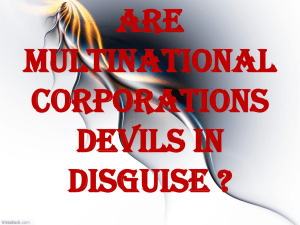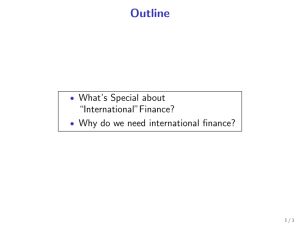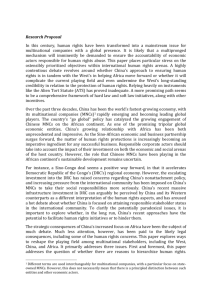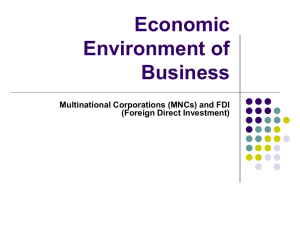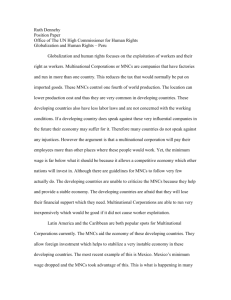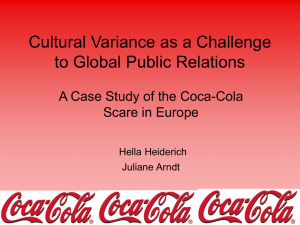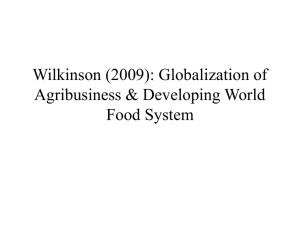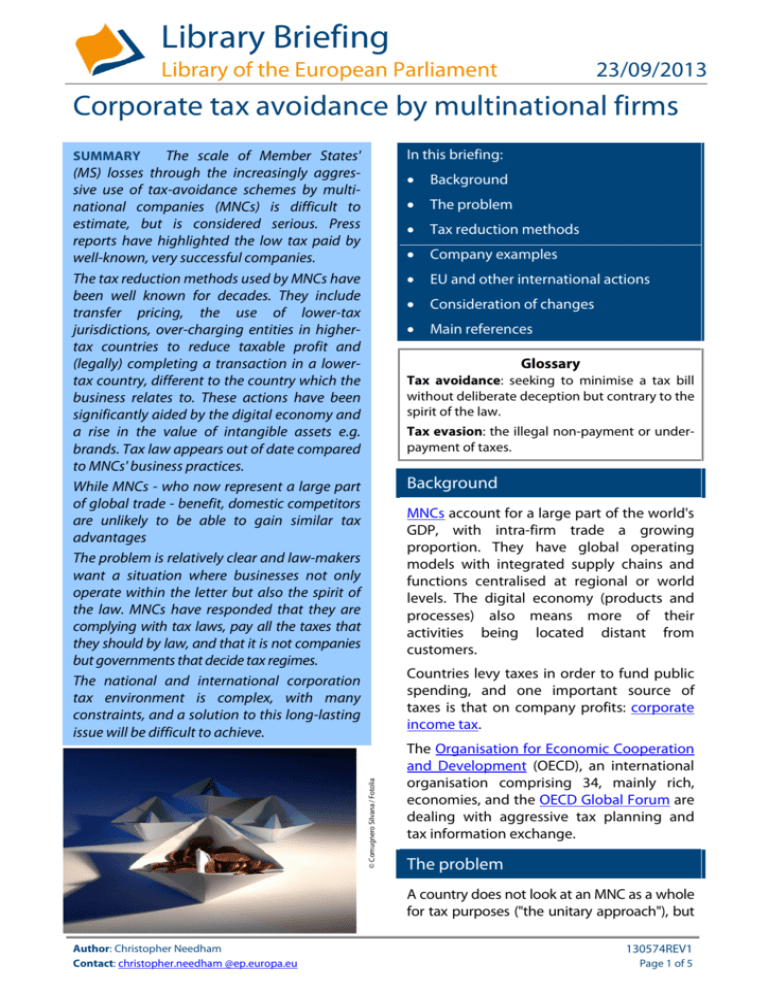
Library Briefing
Library of the European Parliament
23/09/2013
Corporate tax avoidance by multinational firms
In this briefing:
The scale of Member States'
(MS) losses through the increasingly aggressive use of tax-avoidance schemes by multinational companies (MNCs) is difficult to
estimate, but is considered serious. Press
reports have highlighted the low tax paid by
well-known, very successful companies.
The tax reduction methods used by MNCs have
been well known for decades. They include
transfer pricing, the use of lower-tax
jurisdictions, over-charging entities in highertax countries to reduce taxable profit and
(legally) completing a transaction in a lowertax country, different to the country which the
business relates to. These actions have been
significantly aided by the digital economy and
a rise in the value of intangible assets e.g.
brands. Tax law appears out of date compared
to MNCs' business practices.
While MNCs - who now represent a large part
of global trade - benefit, domestic competitors
are unlikely to be able to gain similar tax
advantages
The problem is relatively clear and law-makers
want a situation where businesses not only
operate within the letter but also the spirit of
the law. MNCs have responded that they are
complying with tax laws, pay all the taxes that
they should by law, and that it is not companies
but governments that decide tax regimes.
The national and international corporation
tax environment is complex, with many
constraints, and a solution to this long-lasting
issue will be difficult to achieve.
SUMMARY
Background
The problem
Tax reduction methods
Company examples
EU and other international actions
Consideration of changes
Main references
Glossary
Tax avoidance: seeking to minimise a tax bill
without deliberate deception but contrary to the
spirit of the law.
Tax evasion: the illegal non-payment or underpayment of taxes.
Background
MNCs account for a large part of the world's
GDP, with intra-firm trade a growing
proportion. They have global operating
models with integrated supply chains and
functions centralised at regional or world
levels. The digital economy (products and
processes) also means more of their
activities being located distant from
customers.
© Comugnero Silvana / Fotolia
Countries levy taxes in order to fund public
spending, and one important source of
taxes is that on company profits: corporate
income tax.
The Organisation for Economic Cooperation
and Development (OECD), an international
organisation comprising 34, mainly rich,
economies, and the OECD Global Forum are
dealing with aggressive tax planning and
tax information exchange.
The problem
A country does not look at an MNC as a whole
for tax purposes ("the unitary approach"), but
Author: Christopher Needham
Contact: christopher.needham @ep.europa.eu
130574REV1
Page 1 of 5
Library Briefing
Corporate tax avoidance by multinational firms
only the part(s) operating in its jurisdiction
activities creating them take place,
(the "separate entity approach"). In order to
known as "base erosion and profit
avoid this leading to the double taxation of
shifting" (BEPS). This can be particularly
profits of growing global MNCs, from the
true of internet-enabled transactions.
1920s an international tax regime came into
Most double-taxation treaties tax the
operation. Based on model OECD / United
income of a firm where it has its permanent
Nations treaties, with shared principles and
establishment (PE). The main element
common standards, over 2 500 worldwide
determining if a business has a PE in a
tax agreements now exist between
country is whether it sells or not: legally this
countries to eliminate double taxation.
is determined by the location where
However, these structures have allowed
contracts are signed. In the internet era sales
under-taxation or no taxation at all. This has
activities may occur in a country but can be
become more prevalent
legally finalised electronically
from
the
1960s Businesses make a number of elsewhere…in a lower-tax state.
tax
payments
to
onwards,
as
tax different
Thus MNCs now often do not
governments,
thereby
financing
competition increased.
pay tax where they do business,
Also, countries have
different tax rules and
rates and offer different
tax advantages in order
to attract investment
from other MS and
outside the EU. Some
countries may not tax
some income at all, or at
significantly lower rates
than others.
public goods and services. Some of
the most important are:
value added tax (VAT): a direct
consumption tax on goods and
services purchased
income tax: citizens contribution
based on their salary
social security: citizens contribute
for their health, pension and
other social cover
corporate tax: based on the profit
of the enterprise.
Furthermore, MNCs now have a far greater
ability to separate their different functions
(e.g. sales, research and development etc.).
The digital economy allows MNCs to
operate different remote, internet business
processes and has given more value to
intangible assets, like intellectual property
rights (IPR), to create profits.
Given these elements, managers of MNCs,
often given targets to operate in the most
effective and profitable way, may adjust
their structures and locations to be as tax
efficient as possible.
Any resulting low or non taxation will then
be of concern where:
the use of different tax rules leads to
double non-taxation or taxation lower
than the level of either jurisdiction.
profits are shifted away from the
jurisdictions where the economic
Author: Christopher Needham
Contact: christopher.needham @ep.europa.eu
but rather where they finalise
their activities. A company thus
legally moves revenue there
from its business market. It
gains a competitive advantage,
which is not normally available
to domestic businesses.
Governments’ tax authorities
have to try to verify MNCs'
(increasingly) complex tax
structures.
Tax reduction methods
The methods of tax avoidance by MNCs in
developed countries are well documented,
although there is a lack of reliable and
consistent data, whereas those for
developing countries are less well
understood. The method revolves around
shifting income from higher-tax to lower- or
no-tax countries.
Profit shifting strategy
This is achieved by limiting operational
activities (and related income) in the highertax state, by moving them to a subsidiary
located in a lower-tax state.
Transfer pricing
This is the setting of prices for transactions
between companies that are part of the
same MNC. In the past this mainly
concerned physical goods but now involves
130574REV1
Page 2 of 5
Library Briefing
Corporate tax avoidance by multinational firms
the rights to use intangible goods, and use
of services such as headquarters' support.
Over half of international transactions are
inter-company transactions, and are
therefore not at "arms-length" prices, i.e. as
if purchased from an unrelated third party.
Where the price is inflated, "abusive transfer
pricing" is said to occur. This is one way to
move profits where a subsidiary in a
medium or higher-tax jurisdiction buys
products from another group company in a
lower-tax country.
It is often not obvious how arms-length
prices should be determined. The UK tax
authority has around 65 experts in transfer
pricing.
Corporate debt-equity
Inter-company loans given from entities in
lower-tax states to subsidiary companies in
higher-tax countries pass interest income to
the lower-tax state, reducing the taxable
profit in the higher-tax country. This profit is
further reduced the higher the interest rate
or level of debt. Luxembourg has beneficial
tax treatment of interest income.
Payments for intangibles
A group company in a lower-tax environment with company IPR ownership rights,
charges another group entity in a higher-tax
state for use of an intangible, such as a
technology royalty, licences, brands or
patents. The pricing should reflect the value
of the technology, i.e. how important the
technology is in the creation of the profits.
An MNC can have a company owning its IPR
in a country where no taxes are payable on
licence fees, and then charge its affiliates
around the world for their use.
Shell holding companies
These are found mostly in jurisdictions with
an extensive tax-treaty network and offering
low tax rates on dividends and capital gains
e.g. Belgium, Ireland, the Netherlands and
Switzerland.
The holding company may be a shell
company (no real trading, production or
Author: Christopher Needham
Contact: christopher.needham @ep.europa.eu
distribution activities) or may have
centralised financing, licensing and other
management activities.
Shell holding companies are used in
multiple ways for tax planning activities.
Hybrid entities
These revolve around obtaining a deduction
of the same cost, such as loan interest, from
two different countries based on the
company’s affiliates’ structures. Similar
happens when countries allow dualresidence companies. Ireland, for example,
has companies that are legally based in
Ireland and another country – typically a tax
haven, such as Bermuda.
The "Double Irish with a Dutch sandwich"
This is a known tax-reduction structure
between wholly-owned subsidiaries, which
involves transactions in Ireland, the
Netherlands and Bermuda. The Irish affiliate
has dual residence with Bermuda and moves
profits through another Dutch affiliate. Profits
go to Bermuda and are not taxed since
Bermuda has no corporate income tax.
Conduit
This is where a corporation channels money
through a country (e.g. the Netherlands,
Luxemburg or Mauritius) so benefiting from
a favourable tax rate. Large sums pass via
these preferential tax regimes:
30-40% of all of India’s investments are
via Mauritius, which has received the
investment money from other countries,
often India itself (“round tripping”).
the British Virgin Islands were the second
largest investor in China (14%) in 2010
the top investor in Russia in 2010 was
Cyprus (28%)
Company-specific tax rulings
Some countries (e.g. the Netherlands,
Cyprus, and Luxembourg) allow the direct
negotiation of a tax rate between a
company and the tax authority.
Special tax treatment for individual
companies is practised in many countries, in
130574REV1
Page 3 of 5
Library Briefing
an attempt
investment.
to
attract
Corporate tax avoidance by multinational firms
foreign
direct
Starbucks paid UK corporation tax of £8.6
million between 1998 and 2011 on sales of
over £3 billion. Taxable profit was reduced
Company examples
through interest payments to other parts of
the business and by the 4.7% paid to a
Many well-known MNCs have been
Netherlands based company for intellectual
mentioned in the
property (such as its brand
press recently over Top 50 US software, hardware & internet firms
and business processes).
their
level
of
Permanent
The latter pays a 20% markTax
%
corporate tax. They establishment No Overseas ($ m)
up to a Swiss-based
include:
Income Tax
company on its coffeeIreland
19
79
730
4
568
5.7%
Adobe had a recent
buying operations.
average tax rate on its In major markets 13 22 115 5 538 25%
The UK Parliament's Public
8
3 724
377 10.1%
overseas profits of Switzerland
Accounts Committee has
5
4 324
239 5.5%
below 7%. Its Irish Netherlands
MNC
tax
investigated
4
3 800
942 24.8%
operation generated Unclear
avoidance, including some
80% of its non-US Luxembourg
1
-338
22
of the above companies.
income. Adobe's local Source: Company accounts, Reuters 2013 article
Many more companies – US,
units around the
European…. - follow similar strategies,
world have a tax residence in their markets,
indeed they may be at a competitive
but not as sellers of software, rather as
disadvantage if they do not.
"service providers", i.e. a support function.
This is known for tax purposes as the
EU and other international actions
"Service PE" model.
In its May 2013 plenary, the EP voted two
It was reported that Amazon paid little or
non-legislative resolutions (Fight against tax
no UK corporate tax between 2009 and
fraud, tax evasion and tax havens and the
2011, on sales of over £7.6 billion. Amazon
2013 Annual Tax Report), which included
UK, with over 15 000 staff, is a service
calls for MS governments to close avoidance
operation for its Luxembourg-based
loopholes, combat aggressive tax planning,
company.
and coordinate their tax systems better
Apple had a reported effective rate of tax of
including tax information exchange. It noted
around 2% in recent years on its non-US
that tax lost to avoidance needs to be
profits – approximately 60% of the total –
reduced. Also, the Commission was called to
with sales routed through its Irish
implement country-by-country reporting for
subsidiaries. A US Senate investigation
cross-border companies. MEPs wish the EU
which included Apple’s tax strategy
to lead the efforts of multinational fora to
concluded that its tax arrangements do not
improve tax transparency and information
reflect its business.
exchange.
Google had a reported effective tax rate of
2.4% in 2009 on non-US profits, with the
majority of Google's non-US sales billed in
Ireland. Google Ireland paid, for example, for
the services provided by the 1 300 staff in
the UK, with most UK-related sales of £3.2bn
routed through Ireland. The UK Labour party
leader said that Google paid £10 million in
tax between 2006 and 2011 on revenues of
£11.9 billion.
Author: Christopher Needham
Contact: christopher.needham @ep.europa.eu
The Commission in its December 2012
Recommendation on aggressive tax
planning wants MS to strengthen their
double tax conventions and to adopt a
common general anti-abuse rule (GAAR).
The GAAR would allow MS to tax on the
basis of actual economic substance and
ignore any artificial tax avoidance
arrangements.
130574REV1
Page 4 of 5
Library Briefing
Corporate tax avoidance by multinational firms
Communiqués in 2013 from the G8 leaders'
and G20 Finance Ministers included similar
considerations on reducing taxation loss.
The Council of Europe has noted that tax
losses – including tax avoidance – penalise
ordinary taxpayers, public spending and
threaten good governance, macroeconomic
stability and social cohesion.
Consideration of changes
Current systems have conceptual and
practical difficulties in defining and dealing
with tax avoidance, as they attempt to
measure profits created in a given country.
One of these difficulties is overseas PE
schemes: French, Norwegian and Spanish
attempts to overrule PE schemes to avoid
tax have failed since judges appear reluctant
to over-rule contractual agreements e.g.
sales contracts.
The many previous attempts to structure
business taxes "fairly and uniformly" have
not brought a solution. Among the
elements to resolve are:
conflicts of interest between big and
small countries.
many countries design their tax systems
to attract inward investment. This is a
non-holistic approach, normally contrary
to the achievement of a coherent
international system.
developed countries have higher
overseas income from intangibles
compared to emerging economies.
business groups, including the main US
group on international tax (US Council
for International Business), say revising
PE rules risks creating uncertainty.
The OECD has noted that the anti-avoidance
measures (e.g. general anti-avoidance rules
(GAAR), Controlled Foreign Company rules
(CFC) or thin-capitalisation rules) adopted
by many countries in previous decades are
too complex, costly and often ineffective.
In July 2013, the OECD launched an action
plan to address BEPS, but notes that
unilateral action will not suffice: countries
must apply a holistic and comprehensive
approach given the cross-border nature of
tax evasion and avoidance. This is to be
noted since the fight against tax avoidance
has been considered as basically a national
issue, depending on factors that are not
limited to tax law.
MNCs have to reconcile the pressures of
being "good corporate citizens" and paying
a fair share of tax with those of keeping up
with competitors and giving their providers
of capital a proper return. It has been
argued, however, that any change in rules
should not separate profits from the
economic activity that gives rise to them.
Main references
1. European initiatives on eliminating tax
2.
3.
4.
5.
6.
7.
8.
havens......, DG IPOL study, EP, 2013.
Factbox: How to tackle corporate tax
avoidance, T Bergin, Reuters, 2013.
Tax Havens and the Taxation of
Transnational Corporations, M Henn,
Friedrich-Ebert-Stiftung, 2013.
It’s not just Google…, T Bergin, Reuters, 2013.
The fight against tax fraud and tax evasion,
DG Taxation & Customs Union website, EC.
Commission recommendation on aggressive
tax planning, Dec. 2012 EC.
Harmful tax competition, OECD, 1998.
International Tax Policy Needed to
Counterbalance the Excessive Behaviour of
Multinationals, A de Graaf, EC Tax Review, 2013.
Disclaimer and Copyright
This briefing is a summary of published information and
does not necessarily represent the views of the author or
the European Parliament. The document is exclusively
addressed to the Members and staff of the European
Parliament for their parliamentary work. Links to
information sources within this document may be
inaccessible from locations outside the European
Parliament network. © European Union, 2013. All rights
reserved.
http://www.library.ep.ec
http://libraryeuroparl.wordpress.com
Author: Christopher Needham
Contact: christopher.needham @ep.europa.eu
130574REV1
Page 5 of 5

